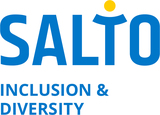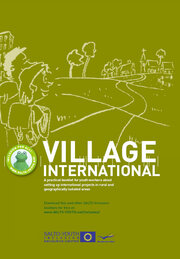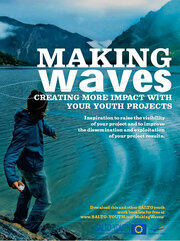SALTO Inclusion Work 2007
- also have a look at the SALTO Inclusion Statistics
Inclusion Capacity Building & Training
There was a big need for training on Inclusion. There has always been a higher number of applicants (2 or 3 times more) than the number of places available at the courses. In 2007 we decided to continue our target group approach and focus on geographic disadvantage:
- TC for Rural & Isolated Youth - in cooperation with Turkish NA
A 5 day training course in Turkey for 25 European youth workers about how to use the Youth in Action programme to create opportunities for rural and isolated youth and keep them from leaving to the cities. - Participation/Contribution to French Seminar on Urban Youth
A 3 day conference in one of the French banlieus, organized by the French NA, bringing together 60 youth workers/experts in the work with urban youth and gathering good practice of YOUTH programme projects in this setting.
The National Agencies had been requesting for a long time Staff Training on inclusion to support their work. SALTO inclusion addressed this need in 2007 through:
NA Round Table about Inclusion Strategies- Bringing together appr 10 NA Inclusion Officers in Belgium for 1.5 days to discuss and give feedback to SALTO Inclusion's "How to develop an Inclusion Strategy" booklet to adapt it to the needs and reality of the NAs, the main target group of this booklet.
- NA Inclusion Officer Staff Training
A 3 day staff training in Belgium for NA Inclusion Officers to exchange about their work and tasks, present good practice and get training about some Inclusion issues. Looking forward to the workplan 2008 to develop coherent national inclusion strategies. In close cooperation with the European Commission.
SALTO Inclusion promoted the use of the European Training Calendar to have a central overview of the wide variety of inclusion training opportunities in Europe. In 2007 there were appr 52 inclusion courses in the calendar - two of which were the SALTO Inclusion courses.
^^ top ^^
Tools & Publications
As is common practice, all useful training methods from the SALTO Inclusion training courses & seminars were documented online in the Toolbox for Training & Youth Work www.salto-youth.net/toolbox/.
- "Village International" Booklet-Setting up Projects for/with Rural & Isolated Youth
An educational booklet based on the Rural & Isolated Youth training course (cooperation with Turkish NA) and other good practices. - Booklet-Setting up Projects for/with Urban Youth
Due to the late dates of the Urban Youth Seminar (Dec 2007) the Urban Youth booklet based on it would not be ready in 2007. Youth and the City saw the light in 2008 - Instead SALTO Inclusion developed Making Waves.
- Making Waves - creating more impact with your youth project
A practical booklet about raising the visibility of a youth project and to improve the dissemination and exploitation of the project results (formerly called valorisation) - Shaping Inclusion - How to develop an Inclusion Strategy
A manual for National Agencies on how to develop (national) inclusion strategies, based on the Round Table on Inclusion Strategies.
Translations of SALTO Inclusion Booklets
SALTO Inclusion promoted the translation of its Inclusion for All booklets into different languages. Translation Guidelines were developed and put online. The first translations were:
- Use Your Hands to Move Ahead > into Czech (by Czech NA)
- Going International > into Dutch (by Flemish-Belgian NA)
- Going International, Use Your Hands, Fit for Life, No Barriers No Borders, Over the Rainbow > into French (by French NA)
SALTO Inclusion Newsletter
SALTO Inclusion sent around 11 newsletters in 2007: with relevantinformation, announcements, good practices and innovative concepts in the field of inclusion.
SALTO Inclusion Website
SALTO Inclusion continued to add resources to its website to make inclusion work as effective and tailor-made as possible. SALTO Inclusion will continue to make its information as accessible and user-friendly as possible.
^^ top ^^
Other Support activities & meetings
Deliver Conceptual Work on Inclusion
SALTO Inclusion has expertise in the Inclusion field and also has access to networks that have specific expertise on inclusion. SALTO Inclusion supported inclusion discussions in Europe with its expertise and networks.
SALTO Inclusion continued its support to National Agencies, relevant Youth organizations and the European Commission in the field of inclusion. SALTO Inclusion played an active role in the European Youth Week (focus on Social Inclusion). SALTO supported the European Commission in developing the Inclusion Strategy and an information leaflet based on it.
SALTO Inclusion participed at relevant stakeholder meetings to (re)present SALTO (e.g. NA meetings, staff training, requests,...), to carrying out relevant inclusion tasks and advising/supporting different actors in the organization of their inclusion efforts (e.g. feedback on their inclusion strategy, inputs on inclusion at meetings, advising or cooperating in training courses,...).
Monitoring Multiplying Effect
SALTO Inclusion consistently prepared its participants of seminars and training courses for multiplying their knowledge and skills gained at the activities (e.g. through action planning, multiplying sessions,...).
SALTO Inclusion also used the SALTO long-term evaluation system documenting participants skills and projects up to 6 months after the course. SALTO Inclusion actively liaised and offered support to former participants at courses and seminars, via virtual platforms and direct contacts.
As mentioned before, the SALTO Inclusion training courses are documented online and will be turned into practical educational publications, to make more people benefit from the content and investment of the course, than only the relatively few participants.
^^ top ^^
Horizontal Tasks & Coordination
SALTO-YOUTH.net website
SALTO Inclusion took a leading role in new website developments, to adapt this tool to the needs of users and keep it as coherent as possible.
Trainers Online for Youth - TOY database
SALTO Inclusion developed and improved further this trainers database, to adapt it to some user-feedback and to the new Youth in Action programme. SALTO Inclusion also carried out the day-to-day management and administration tasks, responded to trainer-linked queries and developments, promoted the database to trainers & users, etc
Developing Quality - also in the field of Inclusion
SALTO Inclusion participated in the development of the quality of projects in the field of inclusion. SALTO Inclusion already developed a Quality Charter to make its way of working more transparent. The conceptual work on inclusion, the staff training for Inclusion officers,... also contributed towards quality of inclusion projects. SALTO Inclusion will also closely cooperate with SALTO Training & Cooperation regarding the use of Youth Pass for specific target groups.
Promotion & representation
SALTO-YOUTH has become a widely known brand in European youth work and training land. Not in the least because of the efforts of SALTO colleagues, not only doing good work, but also their participation in relevant meetings, keeping up contacts with key persons and networks in Europe, getting SALTO into relevant publications, presenting the wealth of resources we have, etc. SALTO Inclusion also set some time and resources aside to take up this function.
Cooperation & Coordination
There are a number of necessary meetings between SALTO colleagues, with the European Commission or relevant NAs to steer the SALTO work and coordinate the efforts done.
^^ top ^^
This workplan was based on the feedback we got in 2006 at the , from youth workers at the Trainer Tool Fair in Paris, from the National Agencies' TCP meeting in Bonn and from discussions with SALTO colleagues and with the European Commission.
Downloads
The following downloads are available:
- SALTO Inclusion 2007 Presentation
In this powerpoint you will find an explanation of SALTO's work and the place of SALTO Inclusion within it. It gives you an overview of SALTOs courses, publications and resources - and a look at the invisible work behind the scenes...
- Village International - setting up international projects with rural youth - 2007
A step by step manual through the different stages of setting up a youth project in your rural or geographically isolated area. With lots of practical tips and tricks. Based on SALTO TC Rural 2007. (Rightclick & download to your PC)
- Making Waves - more impact with your projects - 2010 update
Making Waves takes you on a journey to have the biggest possible impact with your youth projects: make them visible to the outside world and document your project results and make them USED by others. Make Waves - Have Impact !
- Youth and the City - projects in disadvantaged urban areas - 2012 update
An practical manual for youth workers to set up international Youth in Action projects with and for young people in difficult (sub)urban areas. Based on the Urban Solutions seminar (2012) and Urban Youth Seminar (2007).





 Inclusion of ALL
Inclusion of ALL